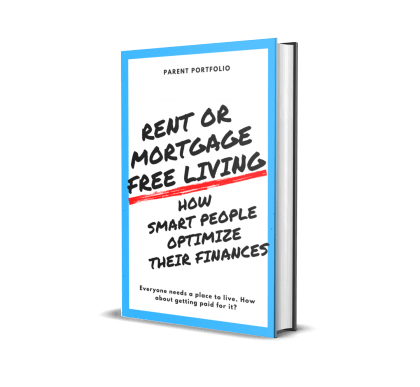Financial Freedom Starts at Home, Avoid Being “House Poor”

If you don’t understand what it means to be ‘house poor,’ you’re not alone. For the sake of knowledge, the term house poor refers to someone who spends excessive income on their home.
A mortgage, property taxes, maintenance, and utilities can eat up a large section of someone’s income, making them essentially ‘poor’ except for their home.
Some people would rather have the stability of a place to live than other creature comforts. In that case, it doesn’t matter to them, but it can be a critical decision for those wondering about paying off their mortgage early, and every angle needs to be analyzed.
Limited Income and the American Dream
Many people dream of owning their own homes. Sometimes they’re just tired of renting, and sometimes it’s more about obtaining the “American Dream.” Whatever the reason, plenty of low or fixed-income people wonder if owning a home is achievable for them.
One individual recently asked if owning a home was possible on social security. And while one commenter was quick to dash their hopes, listing all the “extra” expenses involved in home ownership, others offered possible options for the potential homeowner.
Possible Hangups
Several commenters offered solid reasons that this individual and anyone looking to buy a home might want to consider before signing on the dotted line. Here are some of the most notable.
- Location – Depending on where you’re looking to buy, you can expect to pay wildly different amounts to own a home.
- Zero Property Tax – One individual mentioned areas where the property tax for those over 65 is zero, taking off a considerable expense for someone looking to buy a home on a fixed income.
- Land Contracts – Someone suggested looking into mobile homes, rent-to-own, or someone willing to do a home/land contract.
And while all of these are great suggestions, there are other items to consider if you’re hoping to skate through home ownership without being house poor.
Pros and Cons of an Early Payoff
Dealing with a cash-strapped income situation is always a challenging place to be stuck. Whether your income took a hit, you lost your job due to an illness, or you had to make changes for a different reason, finding yourself without a financial backup can be stressful.
These tips can help you decide if paying your mortgage off early is a good choice — first, the pros of an early payoff.
- Extra Money – Paying off your mortgage early frees up the money you spend to make your monthly payments. That cash can then go toward areas like a maintenance fund or savings.
- Credit Worthiness -paying your mortgage early can increase your creditworthiness and free up some much-needed room if you’d like to open a line of credit or apply for a better credit card or even an auto loan. By holding less credit debt, yours will adjust to show you’re a sure bet for any credit company.
- Lowers Foreclosure Risk – By ending your mortgage payments early and signing off on that last payment, you make yourself look good credit-wise and significantly reduce the risk of your home getting foreclosed on. Now all you have to do is keep up with your property taxes, and that extra cash you’re saving every month can easily take care of taxes or other fees you incur where you live.
While there are some obvious benefits to paying your mortgage off early, there are a couple of reasons you should consider a slower pace for finalizing that last payment.
- Other Debt – By funneling as much income into your mortgage as possible, you might leave yourself strapped for paying down other debt like credit cards or auto loans.
- Tax Deductions – Your mortgage interest is tax deductible, reducing your tax liability. Paying it off early eliminates that deduction and is one you’ll have to consider depending on your circumstances.
- Prepayment Penalty – Some mortgages come with an outstanding prepayment penalty. This fee can cost you if you pay your mortgage early and can cut your cash flow. If you’re considering doing an early payoff, review your mortgage paperwork to be sure you won’t get penalized.
Steps to Avoid The House Poor Scenario
If you fear becoming house poor, there are some steps you can take to ward off this situation. You’ll have to evaluate what you can do, but these can help ensure you have more than enough to keep your home and income up.
- Side Job – to increase your income, you may need to find a side job that’ll boost your monthly earnings so that less of your money will pay for your mortgage and other house-related expenses.
- Cut Costs – While this can be uncomfortable and less-than-fun, cutting costs can free up extra cash to put toward your housing expenses and allow you to pay down your principal faster.
- Refinancing Your Mortgage – This is an excellent option if the current interest rates are lower than what you’re paying. This option can save you a bundle upfront and lower your monthly payments.
- Home Equity – While taking out a loan against your home through an equity line of credit isn’t a viable option for everyone, it can be an excellent way to set aside money for non-housing expenses.
- Downsizing – While letting go of a home might be challenging, it can be pressing if you have too much house and insufficient money. Creating a wider gap between your finances and house-related costs is the fastest way to ensure you don’t end up house poor.
Second Opinions
While paying your mortgage early and eliminating that payment isn’t a straight shot to being house poor, it can lead there if you don’t have a plan of action to deal with other housing-related expenditures.
If you’re unsure, talking to an expert is the best way to avoid this. Someone like a mortgage originator at your banking institution can offer insight into your situation and help you set up a plan for going forward.






